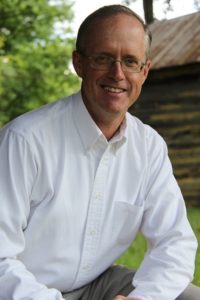Rapping at My Chamber Door
By Tim Tron
Burke County
C.S. Lewis once wrote, “There are only two kinds of people in the end: those who say to God, ‘Thy will be done’ and those to whom God says, in the end, ‘Thy will be done.’ All that are in Hell choose it. Without that self-choice, there could be no Hell. No soul that seriously and constantly desires joy will ever miss it. Those who seek, find. To those who knock, it is opened.”[1]
A long time ago, in what now seems like another life, I spent the summer of 1976 working in a trim shop in Evansville, Indiana, called Vessels. It was the kind of place where people would bring their cars to get their seat covers repaired or replaced with new ones. They also specialized in vinyl roofs and boat covers. It was my first job off the farm, where I had worked most of my teens. This would be the first job where I didn’t receive payment in cash but instead received a real paycheck. My stepdad was the foreman, which was more than comforting because I always had the feeling that someone was looking out for me. That was important because Vessels employed a pretty rough crowd – from Vietnam vets with PTSD to recovering drug addicts and everything in between.
New hires were paired with more experienced employees, so when they put me with Raphael, I didn’t know what to expect. He was a young black man, probably in his late twenties, shorter than me, but had massive biceps and forearms. Rafael kept his hair cut short, and he had a long scar on the side of his face that ran from his cheek to his jaw bone – its existence of which was never mentioned. Rumor was that he boxed on the side, mostly street, bare-knuckle events, and from the looks of it, could handle himself pretty well. Being just a new kid off the farm, it was a very daunting atmosphere. However, it was there that I learned to listen, imitate, and adapt, a trait that would serve me well for the rest of my life.
Raphael and I worked at a large, very worn table grounded to the concrete floor; he on one side, me on the other. There was no air conditioning, only fans that blew the hot summer air around, making for a sultry, fluorescent, dimly lit ambiance. The atmosphere was intoxicating, with odors of fresh vinyl and glue, both ingredients necessary for the work. Raphael and I used hog ring pliers to staple the new seat covers on the frames of the seats after we had removed the old, nasty, torn covers. It was a tedious job, but we were both thankful to have one for our own reasons, so we kept to ourselves mostly. Yet, as one does with anything that challenges your paradigm of life, you slowly learn about the person in the trench next to you, whether you want to or not.
Off and on, Raphael would slowly share glimpses of himself with me in odd ways. We didn’t speak much at first, mostly because he was always whistling. Those melodies he chose were something to which I could relate; old church hymns, songs that I had known all my young life. Yet, instead of my grandma Tron singing God’s praise through pursed lips, it was a young black man. Looking back, he probably knew those were something I could relate to – an unspoken welcome if you will. But my introduction to the world through Raphael didn’t stop there. He would often go into long recantations of literature. At first, they seemed to be mere ramblings of thought, but the more I listened, the more I realized that they were quotes from works of poetry. It wasn’t simply the words he spoke, but more than that, it amazed me at how much he had seemingly memorized. One day, after reciting another lengthy prose, I finally inquired about the piece he had just mentioned. Something about rapping at a door caught my ear.
“The Raven,” he replied, smiling through his thick shadowed mustache. A single gold tooth gleamed from the broad smile. The sweat glistened off of his dark, chiseled forearms.
“Can you teach it to me?”
“Sure, I guess we got plenty of time.” He finished the seat he had just tightened, sitting it up on the table across from me with a loud thump. “Let me get this in that Chevy out there, and we’ll get started.” He dashed off to the parking lot, returning shortly afterward, smiling more than ever. “Now, where do we begin?”
Raphael spent the remainder of the summer sharing various works of poets he liked to memorize with me, but Edgar Allan Poe was by far his favorite. Over and over again, he would work with me learning, line after line, until we could finally repeat them together. “The Raven” seemed to always be our “go-to” piece.
“Once upon a midnight dreary, while I pondered, weak and weary,
Over many a quaint and curious volume of forgotten lore —
While I nodded, nearly napping, suddenly there came a tapping,
As of someone gently rapping, rapping at my chamber door.
“ ’ Tis some visitor,” I muttered, “tapping at my chamber door —
Only this and nothing more.”
To each of us, there was something special about the words we shared. To Raphael, it was the heartache of the man in the tale. The most poignant section of the verse that always stuck with me was the rapping at the door on that bleak, dark night by the raven. In many ways, a broadsword and a door are the same, each having two sides. The blade’s two meanings are as opposing as night and day – one to save lives, the other to take lives.
Similarly, the door has a dual purpose, the inner and the outer. From each side, one can have a different perspective from the one standing on the other side. From whence you stand makes all the difference in the world. Alone, the man in the poem is distraught over his love, and one can surmise that he is slowly drifting into insanity. But who wouldn’t find a knock on the door of one’s house in the middle of the night a bit more compelling than just a curious tap? The same rapping upon the chamber door in the middle of the day is far easier to accept; the other is a sense of impending doom.
Yet, are we not to be prepared for the Lord’s return at any time? As Jesus told his disciples, “For yourselves know perfectly that the day of the Lord so cometh as a thief in the night.”[2] It is this proverbial rapping at our chamber door, deep into the night, which we most dread. For, it is not the known that beckons our fears, but the unknown. Likewise, unless we have the foresight to know who is on the opposite side of that last bastion of barrier between us and the world beyond, we cannot know to whom calls upon us.
Trepidation awaits if we allow it. Yet, when we truly know in our hearts that we can be called upon at any time, therein itself lies a comfort, erasing the mysticism of the unknown. “Behold, I stand at the door, and knock: if any man hear my voice, and open the door, I will come in to him, and will sup with him, and he with me.”[3]
But there is the other side, the portion from which we are the ones to be the caller. It is when we seek God that we are requesting permission to enter into His presence. Before Jesus, only certain priests were allowed to enter into the holiest of holies, and then only at specific times of the year. When Christ shed His blood on the cross, the veil that separated the holiest of holies from the world was torn from top to bottom. It was then if we have requested permission that we were finally allowed to enter into God’s presence; a gift from God to those whom he loved enough to give the life of his only Son. “Then shall ye call upon me, and ye shall go and pray unto me, and I will hearken unto you.13 And ye shall seek me, and find me, when ye shall search for me with all your heart.”[4]
But as clear as the Bible is on seeking Him. But sadly, many will never listen. Their own will, earthly desires, and self-purpose will prove stronger than their desire to know God. Jesus made it perfectly clear when asked about how many will be saved, “Strive to enter in at the strait gate: for many, I say unto you, will seek to enter in, and shall not be able. When once the master of the house is risen up, and hath shut to the door, and ye begin to stand without, and to knock at the door, saying, Lord, Lord, open unto us; and he shall answer and say unto you, I know you not whence ye are: Then shall ye begin to say, We have eaten and drunk in thy presence, and thou hast taught in our streets.27 But he shall say, I tell you, I know you not whence ye are; depart from me, all ye workers of iniquity.28 There shall be weeping and gnashing of teeth, when ye shall see Abraham, and Isaac, and Jacob, and all the prophets, in the kingdom of God, and you yourselves thrust out.”[5]
The summer of 76 eventually ended, and with it, my time at the trim shop. School was about to start up and my full-time summer job had concluded. I never saw Raphael again. It is sometimes odd to think of God working in us, even when we knew him the least. So often, in times of torment and persecution, when we go to God in prayer, we feel him with us, but oddly enough, it is the times we least expect him that he is with us the most. So, it was in my youth.
Time has passed, and like all memories, one wonders how the other acquaintances in their lives faired. God’s path for us is never expected, and through it, when we look back, was there for a purpose. Such is the case for me. For in the shade of the shop lights, in a hot July summer, a young white kid just off the farm and a street-savvy young black man formed a bond over the most unlikely of poets, sharing the words penned some 100 years before them both. Through it, I learned how others, unlike me in so many ways, had riches to share with me that would enhance my journey through life.
Even a secular poem can remind us to seek God, to knock upon his door. When we enter into His presence, we are then within him and He within us – inside God’s dwelling place. From there, we can then perceive the knock from within – the call to serve. So, when that gentle rapping comes at your door, don’t hesitate to open it. “Many are the called, but few are chosen.” So, when your time comes, be prepared to answer, “Yes, Lord, it is I, take me.”
Live your life so that when your judgment day comes, it won’t be your will that had been done, but rather His.
Yes, then you will know you are finally home.
Thanks be to God.
[1] The Great Divorce. Copyright © 1946, C. S Lewis Pte. Ltd. Copyright renewed 1973 C. S. Lewis Pte. Ltd. All rights reserved. Used with permission of HarperCollins Publishers. Words to Live By: A Guide for the Merely Christian. Copyright © 2007 by C. S. Lewis Pte. Ltd. All rights reserved. Used with permission of HarperCollins Publishers.
[2] 1 Thessalonians 5:2 KJV
[3] Revelation 3:30 KJV
[4] Jeremiah 29:12-13 KJV
[5] Luke 13:23-30 KJV
_____________________________________
Timothy W. Tron lives in Collettsville, NC. with his family. He is currently the Systems Administrator for the Computer Science Department at App. State. Timothy is the former Director of the Trail of Faith in Valdese, where he still volunteers and helps with tours. He is the author of a new Christian series, “Children of the Light”, with the first book being, “Bruecke to Heaven”, revised as “Bridge to Heaven”, and his recent book, being the second, “The Light in the Darkness”. He is an active blogger, artist, and musician. Timothy also has a BSEE from UF, and is a Lay Speaker. He is currently acting as the Faculty/Staff Liaison for the Ratio Christi campus ministry at App. State. He can be reached at trontw@appstate.edu You can visit his website at //www.timothywtron.com/ or see more of his writings HERE
_____________________________________






